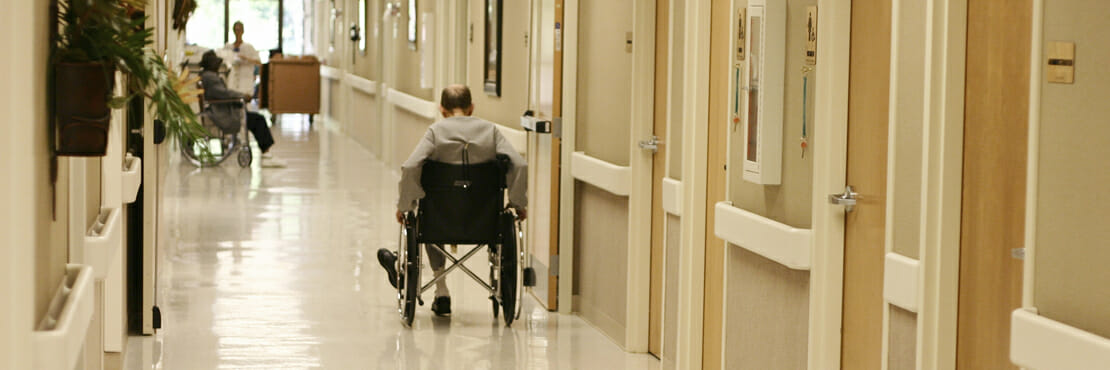Nursing Home Abuse & Neglect
One of the toughest decisions many families will ever have to make is the decision they can no longer take care of an elderly loved one alone, and it’s time to entrust their loved one’s care to others.
This decision can never be taken lightly; families have a right to certain expectations, including the right to professional and proper treatment of their loved one, a right for their loved one to be treated with dignity and respect, and the right of their loved one to finish their final years in peace and comfort. Sadly, this isn’t always the case. Instead of the care they expected, some find their loved ones taken advantage of and receiving substandard care.
Defining Nursing Home Abuse and Neglect
Almost two million Americans live in long-term-care facilities, according to Nursing Home Alert. Federal regulations state that these vulnerable individuals have the right “to be free from verbal, sexual, physical and mental abuse, corporal punishment and involuntary seclusion.” Sadly, nursing home abuse cases have become far too common. According to a government study, in 2012 85 percent of nursing homes reported some sort of abuse. With the elderly population growing, the potential exists for these numbers to grow.
What to Do
If you suspect you or your loved one is a victim of nursing home, hospital or long-term facility abuse or neglect, contact the Khalidi Law Firm PLLC as soon as possible for a free consultation to evaluate the merits of the claim. We receive no fees and you pay no out-of-pocket expenses unless we successfully pursue your claim, but it is important to seek legal counsel quickly to make sure your claim, should you have one, is not barred by the statute of limitations under Arizona law.
Located in Tucson’s Historico Barrio, the firm is familiar and experienced with Arizona law and will make sure your concerns are addressed, and that you or your loved one receives treatment and compensation for any short- or long-term effects of the abuse. Pursing a lawsuit for neglect at a nursing home not only provides compensation for victims, but can help other families as well. It is a safeguard in our society to motivate the industry to follow proper standards.
For one of our attorneys, nursing home abuse and neglect is personal. Read her story below:
My interest in representing those who have been neglected or abused began long before I became a lawyer. My grandmother suffered in a nursing home when I was a teenager. I still remember how frightened and scared she was. From that moment, I knew I wanted to do what I could to protect those who could not protect themselves. In the 25 years that I’ve been practicing law I’ve dedicated a majority of my time advocating for vulnerable adults, including the elderly, as well as children who have been harmed, neglected or abused.
– Lisa Kimmel
Resources
Nursing home neglect and abuse is not just someone else’s problem. Cases have been filed around Arizona as well the rest of the region. One of the ways to keep from placing your loved one in a potentially substandard facility is to research before you make the decision. Medicare has rated 21 nursing home facilities within 25 miles of Tucson. The results show a wide range in care. Five facilities received a below average rating and eight received average ratings, while five facilities were rated much above average and three were above average.
The full rankings are available at:
Signs of Care Facility Abuse and Neglect:
- Bed sores or pressure ulcers
- Unexplained marks, cuts and bruises
- Unexplained broken bones
- Dehydration, weight loss and hunger
- Sepsis or severe infection
- Patient withdrawn or depressed
- Unsanitary living conditions
- Personal items or money disappearing
- Staff restricting patient access
- Injuries requiring hospital or emergency room care
- Injuries by another resident
- Resident heavily sedated or medicated
- Unexplained death
It is cruel and unreasonable to subject loved ones that took care of us when we were young to abuse or neglect when they need help, especially from a $100 billion industry to whom we have given our trust. As long as these abuse and neglect problems persist, our lawyers will hold unscrupulous and negligent operators accountable. We will help bring a measure of justice for victims and their families and deter future misconduct one case at a time.
Questions and Answers
- What is nursing home abuse and neglect?
- What can I do if my loved one is being abused in a nursing home?
- How much is my nursing home abuse lawsuit worth?
- Can we settle a nursing home abuse case outside of court?
- Who can file a lawsuit against a nursing home?
- Is there a time limit for filing a lawsuit against a nursing home?
- What rights do nursing home patients have?
What is nursing home abuse and neglect?
Arizona Law defines abuse as the intentional infliction of physical harm, an injury caused by negligent acts or omissions, unreasonable confinement, sexual abuse, or sexual assault. It includes the impairment of physical condition as evidenced by skin bruising, pressure sores, bleeding, fracture of any bone, subdural hematoma, soft tissue swelling, injury to any internal organ, or any physical condition that imperils health or welfare (A.R.S. §§ 13-3623; 46-451). Some examples of abuse are:
- hitting

- shoving
- tripping
- pushing or pulling
- scratching, slapping or pinching
- cutting
- biting
- sexual abuse
- unnecessary or excessive physical or chemical restraints
- allowing a resident to be abused by other residents.
The state defines neglect as a pattern of conduct, without the person’s informed consent, deprivation of food, water, medication, medical care or services, shelter, cooling, heating, or other services necessary to maintain minimum physical or mental health (A.R.S. § 46-451). Signs of neglect include the following:
- malnutrition
- dehydration
- failure to receive medication
- over-medication
- unexplained injuries
- unexpected contraction of illnesses or diseases
- poor hygiene
What can I do if my loved one is being abused in a nursing home?
Seek legal advice as soon as you suspect abuse or neglect. A civil lawsuit filed by the resident and/or his or her family against the facility will seek compensation for losses related to the abuse, including pain and suffering. Criminal litigation is typically reserved for extreme cases where the facility’s behavior and failure to meet state and federal regulation standards requires the home to be held accountable for their actions in a court of law. Criminal charges are brought by the government rather than individuals.
How much is my nursing home abuse lawsuit worth?
In determining what your case is worth, the court will examine factors including the duration of abuse; the type of abuse inflicted; types of injuries sustained; related current and future medical costs; and pain and suffering. These factors can be used in settlement negotiations or as evidence if the case goes to court. It is hard to estimate an actual amount without a review of the evidence and documentation of your specific case.
Can we settle a nursing home abuse case outside of court?
Most nursing home neglect and abuse cases are settled outside of court. However, as experienced trial lawyers, we will take your case to court if we believe it is in your best interest.
Who can file a lawsuit against a nursing home?
A lawsuit can be filed by either the resident or by a family member on their behalf. Oftentimes, this will depend on the mental state and abilities of the resident.
Is there a time limit for filing a lawsuit against a nursing home?
A lawsuit alleging nursing home negligence has a deadline, known as a statute of limitations, which requires that your lawsuit must be filed by a specific date or you lose your right to sue. If you suspect neglect or abuse, you should consult an attorney as soon as possible.
What rights do nursing home patients have?
Nursing home residents have certain rights and protections under the law. A nursing home must list and give all new residents a copy of these rights. These resident rights include, but are not limited to:
- The right to be treated with dignity and respect.
- The right to be informed in writing about services and fees before you enter the nursing home.
- The right to manage your own money or to choose someone else you trust to do this for you.
- The right to privacy, and to keep and use your personal belongings and property as long as it doesn’t interfere with the rights, health, or safety of others.
- The right to be informed about your medical condition, medications, and to see your own doctor. You also have the right to refuse medications and treatments.
- The right to have a choice over your schedule (for example, when you get up and go to sleep), your activities and other preferences that are important to you.
- The right to an environment more like a home that maximizes your comfort and provides you with assistance to be as independent as possible.
We’re here to help.
If you suspect that your loved one has been the victim of nursing home neglect or abuse in Arizona, contact the Khalidi Law Firm PLLC right away. Remember that there are time limits for filing such claims, and we don’t want you to give up your right to seek compensation. For a free consultation, call our office at 520-629-9909 or use our convenient online contact form.

